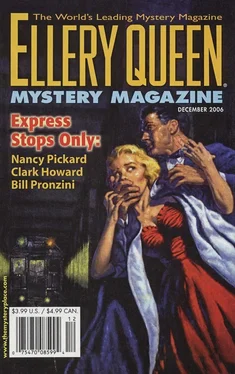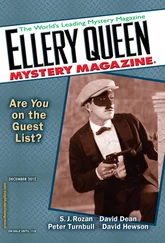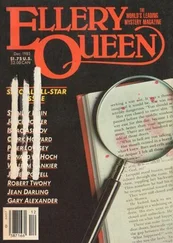“Where?” Sabina asked. “You said you looked into that room and there was no place for a man to hide.”
“No obvious place. Corby counted on the fact that the first inspection would be cursory, and that is what happened. If there’d been time for a careful inspection then, I would have found him quickly enough. But I and the others were intent on finding out what had happened to Lansing.”
“Well? Where was he?”
“When I first looked in the room, I registered a single sack of hops propped against the end wall. When I returned later, the sack was no longer there; it had been moved back into the tightly wedged row along the side wall. That fact and the pile of empty hop sacks gave me the answer.”
“Ah! Corby hid inside one of the empty sacks.”
“Just so. He dragged a full sack from the end of the row, climbed into an empty sack or pulled it down over him, and wedged himself into the space. When Malloy opened the storeroom door and we rushed in, Corby held himself in such a position that he resembled the other sacks in the row. Now you see what I meant by his stature being proof of his guilt. Only a bantam-sized man could have fit inside a fifty-pound hop sack.”
“And while you and the other men were huddled around Lansing’s body, Corby stepped out of the sack, tossed it onto the pile of empties, returned the full sack to its proper place, and pretended to have just arrived.”
Quincannon nodded. “It struck me odd at the time that he should have shown up when he did. A brewery’s bookkeeper has little business in the storerooms. Unless he’d been there all along and his business was murder.”
“The hop flowers you found in his office came from the hideout sack?”
“Yes. Caught on the twill of his trousers or inside the cuffs.”
“And the lupulin?”
“Also from the inside of the sack. Golden Gate buys its hops from a farm in Oregon’s Willamette Valley. The flowers are picked, dried, and sacked there, and now and then dried hops are put into bags previously used by pickers. In such cases, a residue of the yellow powder clings to the inside of the burlap. Corby hadn’t changed trousers when I apprehended him; the yellow residue was still visible on both legs.”
“Well done, John, I must say. But I do have one more question.”
“Ask it, my dear.”
“I assume you turned the partially burned note over to the police as evidence against Corby. Did you also turn over the two thousand dollars he took from Lansing’s rooms?”
Quincannon assumed an injured expression. “And have it disappear into the pockets of a corrupt bluecoat five minutes after I left the Hall of Justice? That would have been irresponsible.”
“Which means you still have the money and you intend to keep it.”
“And why not?” he said defensively. “It doesn’t legally belong to our client or to anyone else. We have just as much right to it as a fat jailer or corrupt desk sergeant. More of a right, by godfrey, as an added bonus for pure and noble detective work. And I won’t listen to any argument to the contrary.”
“I won’t even try. When it comes to money, John Quincannon, you’re incorrigible.”
He gazed fondly, longingly into her dark blue eyes. Money was not the only thing about which he was incorrigible.
Copyright © 2006 by Bill Pronzini












